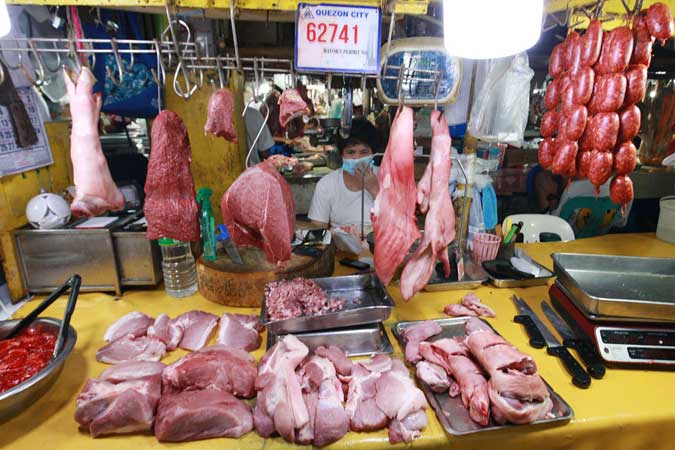Inflation eases to 4.5% in March

Ana Olivia A. Tirona, Researcher
INFLATION eased in March after five straight months of acceleration, as food prices increased at a slower pace, the government’s statistical agency reported on Tuesday.
Preliminary data from the Philippine Statistics Authority (PSA) showed headline inflation at 4.5% in March, slowing from the year-on-year rate of 4.7% in February. However, this was still above the 2.5% recorded in March last year.
The latest headline figure is lower than the 4.8% median in a BusinessWorld poll conducted late last week and falls within the 4.2%-5% estimate given by the Bangko Sentral ng Pilipinas (BSP) for March.

Year-to-date inflation settled at 4.5%, beyond the BSP’s 2-4% target this year and above the forecast of 4.2% for the entire year.
Core inflation, which discounted volatile prices of food and energy items, stood at 3.5%. This was unchanged from the rate recorded in the previous month but faster than the 3% in the same month last year.
The PSA attributed the easing in March to the slower increase in prices of heavily weighted food and non-alcoholic beverages at 5.8% from 6.7% in February. Food and non-alcoholic beverages account for 38.3% of the theoretical basket of goods that an average Filipino household consumes.
Inflation on food items stood at 6.2% in March, slower than 7% in February, but still higher compared with the 2.6% posted in March last year.
The PSA also noted slower annual rates in alcoholic beverages and tobacco (12.1% from 12.2%); furnishing, household equipment and routine maintenance of the house (1.9% from 2.4%); communication (0.2% from 0.3%); and restaurant and miscellaneous goods and services (3.1% from 3.2%).
Meanwhile, the inflation rate for the bottom 30% of income households, stood at 5.5% in March, steady from the rate recorded in the previous month, but still faster than the 2.4% in March 2020.
“The overall latest outturn is consistent with expectations that inflation could settle above the high end of the target in 2021, reflecting the impact of supply-side constraints on domestic prices of key food commodities, such as meat, as well as the continuing rise in world oil prices,” BSP Governor Benjamin E. Diokno said in Viber message to reporters.
“Nevertheless, inflation is still seen to return to within the target band in 2022 as supply-side influences subside,” he added.
In a separate statement, the National Economic and Development Authority said the lower inflation rate in March “is a good indicator of price stabilization” and expects succeeding inflation rates to “align with targets soon as a result of proactive interventions.”
RATES SEEN ON HOLD
BSP’s Mr. Diokno said the prevailing monetary policy settings “remain appropriate” to support the government’s efforts to put the economy back on track.
“At the same time, the Monetary Board emphasizes that the timely implementation of non-monetary interventions is crucial in mitigating the impact of supply-side pressures on inflation and thereby preventing them from spilling over as second-round effects,” he said, adding that the central bank is “prepared to take immediate measures as appropriate.”
The BSP’s Monetary Board kept the benchmark overnight reverse repurchase rate at an all-time low of 2% for a third consecutive meeting on March 25 as it continues to provide support to the economy amid emerging risks from the fresh surge in COVID-19 (coronavirus disease 2019) cases. Rates for the overnight lending and deposit facilities were likewise maintained at 2.5% and 1.5%, respectively.
Economists see the central bank to keep rates on hold in the next monetary policy meeting to be held on May 13.
“[W]e expect BSP to keep policy rates at 2% in order to bolster the economic recovery with several regions now under strict lockdown due to a recent spike in new COVID-19 infections,” ING Bank N.V. Manila Branch Senior Economist Nicholas Antonio T. Mapa said in a statement to reporters.
“BSP will only consider recalibrating monetary policy should second-round effects such as wage hikes become apparent or if inflation expectations become disanchored,” he added.
In a separate statement, ANZ Research economists Rini Sen and Sanjay Mathur said a long pause in rates is “warranted” at this point as they believe the BSP will continue to monitor inflation figures despite prolonged elevated prices in food items due to extended lockdowns.
Metro Manila and the provinces of Bulacan, Cavite, Laguna, and Rizal will remain under “extended community quarantine” until April 11.
Security Bank Corp. Chief Economist Robert Dan J. Roces shared the same assessment: “[A]s much as the elevated inflation path could make the BSP uneasy, we believe the central bank will prioritize supporting the economic recovery and therefore rate hikes at this point will be counter-productive,” he said in a Viber message to BusinessWorld.
For Pantheon Macroeconomics Senior Asia Economist Miguel Chanco: “[T]he BSP is likely to continue to stand pat, given the renewed and intense COVID-19 headwinds domestically.”
“An outright double-dip in quarter-on-quarter gross domestic product still is on the cards, with the recent extension of anti-virus measures in line with our below-consensus expectations,” he said.
The Department of Health reported 9,373 new COVID-19 cases on Tuesday, bringing the total number of cases to 812,760 and active cases to 152,562. — with inputs from Beatrice M. Laforga and Luz Wendy T. Noble
